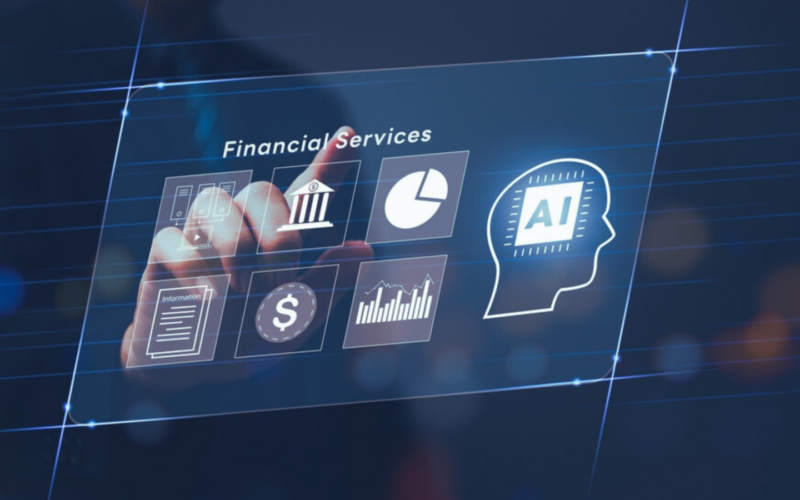Managing fintech operations today isn’t easy. You’re balancing the pressure of scaling, meeting stringent security regulations, improving customer satisfaction, and staying ahead of competitors. But let’s face it: without the right technology, you’re always playing catch-up.
Fintech software IT services are no longer just a nice-to-have – they’re essential. They enable you to automate processes, safeguard data, enhance customer experiences, and provide the agility needed to compete in a fast-growing financial scene. If you’re still relying on outdated systems or manual processes, you’re already falling behind.
In this blog, we’ll break down how fintech software IT services are transforming financial businesses; not with abstract concepts, but with real, actionable strategies. You’ll learn:
- The core challenges that hold fintech businesses back
- How fintech IT services like AI-driven automation, blockchain security, and custom software development solve these issues
- The practical steps for implementing these services in your organization
- How to scale your operations efficiently while improving your bottom line
TL;DR
- Fintech software and IT services are essential for automating operations, enhancing security, and improving customer experiences, thereby helping businesses stay competitive.
- AI/ML reduces fraud, predicts market trends, and automates decision-making, driving efficiency and growth.
- Blockchain ensures secure transactions and enhances transparency, with applications in cross-border payments and decentralized finance.
- Cloud computing provides scalable infrastructure, enabling fintech companies to adapt to demand and optimize costs quickly.
- UX/UI design plays a critical role in increasing customer satisfaction and retention, ensuring seamless and personalized user experiences.
- Future trends like Generative AI, Open Banking, and CBDCs are shaping the fintech industry’s next phase, offering new opportunities for innovation.
First, let’s examine the hurdles that fintech companies face and how these challenges can hinder growth if left unaddressed.
The Challenges in the Fintech Industry Today
Fintech companies are at the forefront of financial innovation. From growing customer expectations to ever-tightening regulations, the pressure to innovate and stay competitive is immense. But the journey is fraught with unique challenges that can hinder growth and competitiveness.
Here’s a closer look at the most pressing issues:
1. Slow Digital Transformation
Despite the rapid pace of technological advancement, many fintech firms are still grappling with outdated legacy systems. This lag in digital adoption can lead to inefficiencies and missed opportunities.
For instance, a significant portion of financial institutions has yet to integrate cloud-based solutions, hindering their full scalability and agility.
2. Cybersecurity Threats
The fintech sector is a prime target for cyberattacks due to the sensitive nature of financial data. In 2024, over 75% of targeted cyberattacks began with phishing emails, highlighting the sector’s vulnerability to such threats.
Moreover, the increasing sophistication of ransomware attacks poses a significant risk to fintech operations.
3. Regulatory Compliance
Figuring out the complex web of financial regulations remains a significant challenge. Fintech companies must comply with various global standards, including GDPR and PSD2, which require robust data protection measures and transparency.
Non-compliance can result in hefty fines and damage to reputation.
4. Customer Retention and Engagement
In an industry where customer trust is paramount, maintaining engagement is crucial. Fintech companies must offer seamless user experiences, personalized services, and responsive customer support to retain clients.
Failure to do so can lead to high churn rates and loss of market share.
5. Intense Competition
Fintech is crowded, with numerous startups and established financial institutions vying for market dominance. To remain competitive, companies must continually innovate, adapt to market demands, and utilize emerging technologies to differentiate themselves.
If these challenges sound familiar, you’re not alone. Codewave’s Fintech Software Development Services can help you overcome these hurdles with solutions like AI-driven automation and more. Explore our services today!
Now that we’ve outlined the key challenges, let’s explore how fintech software IT services can provide real, actionable solutions.
How Fintech Software IT Services Address These Challenges?
In the face of mounting pressures, fintech companies are turning to specialized IT services to sort out the complexities of the modern financial landscape. Here’s how these services are making a measurable impact:
1. AI and Machine Learning for Enhanced Decision-Making
ML and AI in the fintech sector are revolutionizing by enabling data-driven decision-making and automation. For instance, AI algorithms can analyze vast amounts of transaction data to detect fraudulent activities in real-time, significantly reducing the risk of financial crimes.
Additionally, ML models can predict market trends, allowing firms to make informed investment decisions. Detection accuracy has improved by 40%, and financial losses have dropped significantly.
- Real-World Example:
PayPal’s system uses continually learning AI models that quickly analyse billions of data points and update when patterns change. This means the system can help detect potential new scams more quickly, even if it has never encountered that specific scam before.
For more insights on how AI is transforming the fintech scenario, explore our blog on AI Use Cases in Fintech!
2. Blockchain for Secure and Transparent Transactions
Blockchain technology provides a decentralized and immutable ledger, ensuring transparency and security in financial transactions. By adopting blockchain, fintech companies can offer services like cross-border payments with reduced transaction fees and settlement times.
- Real-World Example:
A notable player in the cross-border payment space is Airwallex, a financial technology platform that has made waves with its multi-currency accounts and forex services. In 2023, Airwallex has helped businesses manage international transactions seamlessly.
3. Cloud Computing for Scalability and Flexibility
Cloud computing offers fintech companies the ability to scale their infrastructure according to demand, ensuring optimal performance during peak times. This flexibility allows for cost-effective operations and the rapid deployment of new services.
- Real-World Example:
The Financial Services Cloud (FSC) market is experiencing significant concentration, with a few major players like Salesforce, Microsoft, Amazon Web Services (AWS), and IBM holding a dominant share. These companies collectively account for over 70% of the market, estimated at $25 billion in 2023.
4. UX/UI Design for Improved Customer Experience
UX design and UI design play a crucial role in customer retention. Intuitive and user-friendly interfaces enhance customer satisfaction, leading to increased engagement and loyalty.
- Real-World Example:
A mid-size European fintech company rebuilt its savings app in 2024. After a complete redesign that focused on mobile-first flow, added visual budgeting tools, biometric login, and AI suggestions for goal setting, the app’s retention rate jumped 30% in three months.
5. Regulatory Technology (RegTech) for Compliance Management
RegTech solutions assist fintech companies in sorting the complex regulatory landscape by automating compliance processes and ensuring adherence to legal standards. This reduces the risk of non-compliance penalties and enhances operational efficiency.
- Real-World Example:
RegTech with FinRegE worked in reducing the banking risks, the level of human capital employed, and increasing the efficiency and accuracy with an automated system. A saving of over 60% in costs and a 100% reduction in risks in managing regulatory changes was observed.
Want to see how our services have transformed other businesses? Check out our portfolio for more success stories!
Having seen how these services address key issues, it’s time to examine the tangible benefits they provide, such as enhanced security and operational efficiency.
The Benefits of Fintech Software IT Services
Fintech software IT services aren’t just about keeping up with the competition but creating significant, measurable improvements across various aspects of your business.
By embracing modern technology, fintech companies can unlock a range of benefits that enhance efficiency, security, and overall customer satisfaction. Here’s how:
1. Increased Operational Efficiency and Cost Savings
Automation through AI, ML, and cloud computing significantly reduces manual processes, resulting in substantial time and cost savings. Fintech companies can free up resources for innovation and customer-focused initiatives.
2. Enhanced Security and Reduced Risk
Blockchain and advanced encryption technologies offer solid solutions that significantly mitigate the risk of cyberattacks. By using decentralized ledgers and AI-powered security systems, fintech businesses can ensure that their customers’ data is always secure and that regulatory compliance is consistently met.
3. Scalable Infrastructure for Growth
Cloud infrastructure plays a critical role here, allowing companies to scale resources without hefty upfront investments in physical hardware. With cloud computing, fintech companies can quickly adapt to fluctuating demands, ensuring optimal performance without compromising on speed or reliability.
4. Faster Time-to-Market
Speed is a competitive advantage in the fintech world. Launching new products and services quickly can provide a crucial edge. Rapid iterations and development cycles enable companies to adapt quickly to market demands and customer needs, thereby accelerating growth.
5. Improved Customer Satisfaction and Retention
Fintech companies that prioritize UX/UI design and use personalized services can significantly improve customer satisfaction. Personalized recommendations powered by AI, intuitive app designs, and seamless integrations contribute to higher engagement, better retention, and increased customer lifetime value.
As fintech continues to evolve, staying ahead requires understanding the future trends that will shape the industry. Let’s explore the innovations that will define fintech’s next chapter and how they will impact your business.
Future Trends in Fintech Software IT Services
The fintech scenario is undergoing a profound transformation, driven by technological advancements and evolving market demands. To maintain a competitive edge, fintech companies must stay abreast of some emerging trends.
Here are some key trends to watch:
1. Generative AI: Revolutionizing Financial Services
Generative AI is poised to redefine customer interactions and operational efficiencies in the fintech sector. By using large language models (LLMs), fintech platforms can offer personalized financial advice, automate compliance processes, and enhance customer support through intelligent chatbots.
- For instance, Neurofin, a fintech infrastructure startup, has secured $1.6 million in seed funding to develop GenAI-powered solutions aimed at automating operations and compliance within India’s banking and financial services sector.
2. Blockchain: Beyond Cryptocurrencies
Blockchain technology is expanding its applications beyond cryptocurrencies. Financial institutions are exploring blockchain for secure and transparent transactions, smart contracts, and decentralized finance (DeFi) solutions.
- Figure Technology Solutions, a blockchain-based home equity loan provider, raised $787.5 million in an IPO and is utilizing blockchain to streamline lending processes and reduce transaction costs.
3. Open Banking and Embedded Finance
Open banking is facilitating the development of embedded finance solutions, allowing non-financial platforms to integrate financial services seamlessly.
- This trend enables fintech companies to offer specialized financial products within various ecosystems, enhancing customer engagement and expanding market reach.
4. Cybersecurity: Implementing Zero Trust Architectures
With the increasing frequency of cyber threats, fintech companies are adopting zero-trust security models to safeguard sensitive financial data.
- A proposed blockchain-enabled zero-trust framework utilizes Ethereum smart contracts to enforce multi-factor authentication and role-based access control, mitigating risks associated with insider threats and advanced persistent attacks
5. Digital Identity Verification
Digital identity solutions are becoming integral to fintech services, ensuring secure and efficient customer onboarding.
- By utilizing biometric authentication and blockchain technology, fintech platforms can enhance identity verification processes, reducing fraud and improving user experience.
6. Central Bank Digital Currencies (CBDCs)
Central banks worldwide are exploring the issuance of digital currencies to modernize financial systems and enhance monetary policy effectiveness.
- In India, fintech firm Cred has integrated access to the central bank’s digital currency (e-rupee), facilitating seamless digital transactions for users.
Now that we’ve explored the key trends and technologies shaping the future of fintech, it’s clear that embracing innovation is not just an option – it’s a necessity.
But with so many emerging technologies and evolving market demands, it can be overwhelming to know where to start or how to integrate them effectively. That’s where Codewave comes in.
Why Codewave is Your Ideal Partner in Implementing Fintech IT Services?
The fintech sector is projected to grow to USD 1,126.64 by 2032, with technologies like AI, blockchain, and cloud computing driving this growth. As businesses look to capitalize on this rapid transformation, it’s crucial to implement the right technologies that align with your specific goals and bring tangible value to your operations.
At Codewave, we ensure your fintech solutions are not just future-proof but also scalable and aligned with your growth objectives.
Here’s why you should choose us as your partner:
- Tailored Fintech Solutions: We don’t offer one-size-fits-all solutions. Our fintech services are designed to meet your unique business requirements, ensuring that technology works in your favor.
- Scalable & Future-Ready: The fintech landscape is evolving rapidly, and so should your technology. Our solutions are built to scale with your business, allowing you to stay ahead of industry changes.
- Seamless Integration: Whether you’re upgrading existing systems or starting from scratch, we ensure that our fintech solutions integrate smoothly into your current infrastructure, minimizing disruption and maximizing results.
- Proven Results: With a strong track record of successful fintech implementations, Codewave delivers systems that generate real, measurable impact—whether it’s through cost savings, improved security, or enhanced customer experiences.
If you’re ready to utilize fintech software IT services to drive your business forward, Codewave is here to help. Our team of experts will guide you every step of the way in embracing the future of financial services.
Get a free consultation with our experts and see how we can accelerate your fintech transformation!
FAQs
1. What are Fintech Software IT Services?
Fintech Software IT Services encompass a range of technological solutions tailored for the financial sector. These services include custom software development, mobile and web application development, UX/UI design, AI/ML integration, and digital transformation strategies.
2. How do these services benefit fintech companies?
Implementing Fintech Software IT Services can lead to increased operational efficiency, reduced costs, enhanced security, and improved customer satisfaction. For instance, automation can streamline processes, while AI-driven analytics can offer personalized financial services.
3. What are the emerging trends in fintech technology?
Emerging trends in fintech include the integration of Generative AI for personalized services, the adoption of blockchain for secure transactions, the rise of embedded finance models, and the implementation of zero-trust cybersecurity frameworks.
4. Why is Codewave a suitable partner for fintech IT services?
Codewave specializes in delivering tailored fintech solutions that align with business objectives. Their expertise spans various services, including AI/ML development, mobile and web application development, and digital transformation strategies.
5. How can fintech companies stay ahead of technological advancements?
To stay ahead, fintech companies should continuously monitor technological advancements and invest in research and development. Adopting a proactive approach towards emerging technologies ensures sustained innovation and competitiveness in the evolving financial sector.
Codewave is a UX first design thinking & digital transformation services company, designing & engineering innovative mobile apps, cloud, & edge solutions.







